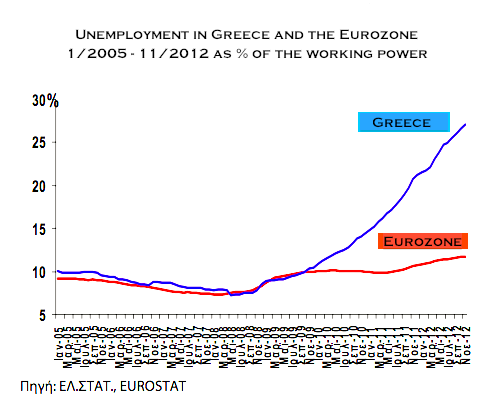Photo: To Vima
Currently, one of the most crucial points in the programme of the Greek government is the dismissal of 25 thousand public sector workers by the end of the year. This affects employees occupying administrative positions that are to be closed and announced by the end of February as shown by the weekly report of Eurobank on the economic development of Greece, which monitors and analyzes the performance of the financial programme of the government.
The government has announced that instead of resorting to cuts it would reappoint 1,821 public workers to fill 2,423 vacancies in the ministries of labour, social security, health care, civil order and justice. "Taking into account the fact that the vacancies announced in the public administration exceed the number of dismissed workers, dismissals are not to be expected," reads the report of the financial institution. The financial analysts forecast that the government would seek the permission of the supervisors of the International Monetary Fund, the European Commission and the European Central Bank to postpone actual redundancies as long as possible.
The lenders’ mission will be back in Athens early next week to inspect the implementation of the stability programme, which was agreed in late 2012. The issue of the removal of the 25 thousand public workers should have been resolved by that time in order for the country to continue to receive the financial aid.
The lenders’ mission will be back in Athens early next week to inspect the implementation of the stability programme, which was agreed in late 2012. The issue of the removal of the 25 thousand public workers should have been resolved by that time in order for the country to continue to receive the financial aid. "The completion of the "removal programme" (applicable to public workers) has a political price but at the same time, it will increase the confidence not only in the Greek government, but in the country as a whole," the analysts note.
The bank expects a critical first quarter of this year because of the introduction of a series of new taxes that are extremely unpopular among the public. The success of the government as regards the revenue policy will depend on the collection of overdue debts to the state, the making of successful privatization deals, and the launching of major infrastructure projects as well as of the rest of the European subsidies (EMPA).
The European Commission should allocate 2.8 billion euro from the European Financial Stability Facility (EFSF) before the last week of February. Eurobank considers that this will not be a problem, because Greece has fulfilled its obligations under the contract for financial aid at this stage. The government has introduced a bill to update the medium-term fiscal consolidation plan (2013-2016), which sets the maximum level of expenditure of the ministries in the central government.
Meanwhile, unemployment in Greece in November 2012 rose to 27% of the active working population,  which is an increase of 10% compared to the same period last year and the prospects are that it will continue to grow. The number of unemployed exceeds 1.3 million and the number of citizens registered as working is only 3.6 million in a country with a population of 11 million. Greece has displaced Spain from the first place as regards the unemployment rate among the European Union countries, the situation among young people remaining the most serious. 62% of young people under the age of 25 remain outside the labour market regardless of their level of education and additional skills whereas the number of unemployed under the age of 25 in 2008 accounted for 23% as reported by Eurobank.
which is an increase of 10% compared to the same period last year and the prospects are that it will continue to grow. The number of unemployed exceeds 1.3 million and the number of citizens registered as working is only 3.6 million in a country with a population of 11 million. Greece has displaced Spain from the first place as regards the unemployment rate among the European Union countries, the situation among young people remaining the most serious. 62% of young people under the age of 25 remain outside the labour market regardless of their level of education and additional skills whereas the number of unemployed under the age of 25 in 2008 accounted for 23% as reported by Eurobank.